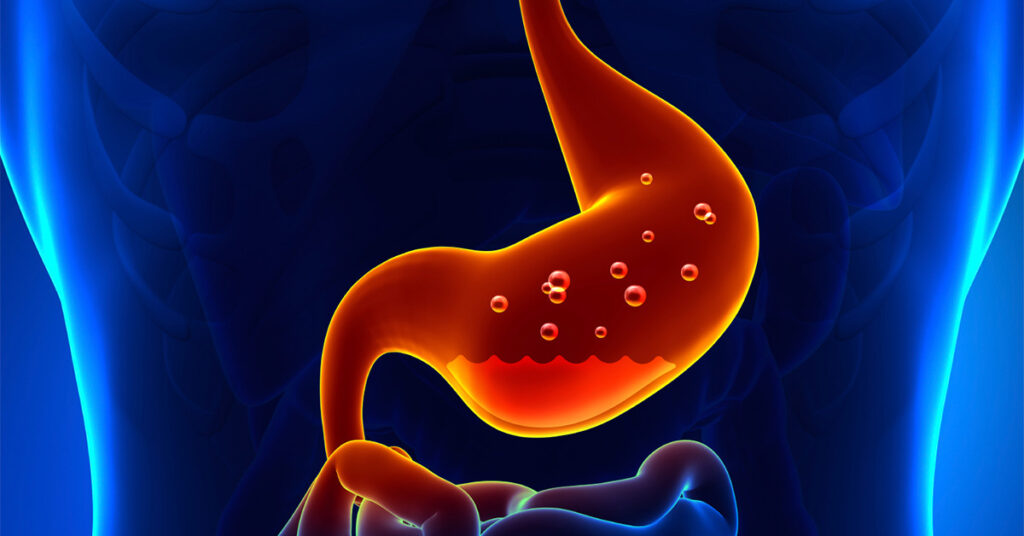Stomach acidity is an important indicator of health that directly depends on one of the most important fluids in the body – hydrochloric acid (HCl).
Everyone is worried that the stomach acidity may increase. But you should worry about lowering it. This is a very common problem, especially in older people.
Heartburn, frequent bloating, skin problems, frequent infections, vitamin and mineral deficiencies indicate that the nutrients are poorly absorbed.
What is hydrochloric acid responsible for?
It supports the natural acidic environment in the stomach.
The stomach is the only place in the body with very high acidity. If the acidity of the stomach is below 1, then we lose our natural defense against pathogens, as well as inefficiently absorb nutrients.
Hydrochloric acid is a natural component of gastric juice, which is produced by the cells of the stomach and helps not only to break down food, but also to rid the body of pathogens.
Why is the production of hydrochloric acid reduced?
-
- The stomach is prevented from living normally by the love of society for processed refined products. Of course, it is much easier to warm up ready-made pancakes, eat a chocolate bar or a donut without during work.
- Fast food and complete inattention to how the intestines react to a particular product – reasons that influence our stomach acidity.
- The more unnatural, processed, and incomprehensible your diet is, the less your body understands what to do with it all.
- Chronic stress is a root of a huge number of health problems. Unfortunately, the natural production of hydrochloric acid is reduced under stress. This is how cortisol works, for example.
- Overtraining or, on the contrary, lack of activity.
- Smoking, alcohol.
- Age over 60 years.
- Ignoring food allergies and intolerances. Be sure to understand why the stomach hurts, bloating appears, etc. This is not normal, it should not be so-do not tolerate it.
- Eating disorders: both overeating and strict diets with completely insane restrictions deprive the stomach of the ability to secrete hydrochloric acid in the normal mode.
How does hydrochloric acid work?
1. Healthy digestion.
Hydrochloric acid helps break down incoming food, and especially protein products. HCL is paired with the enzyme pepsin, which is responsible for the breakdown of proteins, without hydrochloric acid, pepsin is ineffective.
Also, acid production is a signal to the liver and pancreas that bile and enzymes are required to start the process of digesting food and assimilating nutrients.
2. Protective function. Hydrochloric acid does not allow pathogens to survive in the stomach. If the acidity is low, there is a huge risk of excessive bacterial growth in the small intestine.
3. Splitting allergens into smaller molecules. Normal stomach acidity significantly reduces the risk of developing food allergies and “leaky gut syndrome”. That is, your immune system is not distracted from important things – the stomach with all the malicious” parasites ” is sorted out at the entrance.
4. Skin health. Clean skin is, again, an indicator of intestinal health, normal immunity and timely neutralization of pathogens.
5. High-quality assimilation of protein food. The reduced acidity of the stomach, unfortunately, determines our inability to deal with such” complex ” products as meat.
What to do to control stomach acidity?
-
- Start with a change of your lifestyle. The intestines calmed down, the nutrients began to be slowly absorbed, and the acidity returned to normal.
- Remove everything that mocks the intestines. Nothing “ready-to-eat”. Cook for yourself. Processed foods are the main triggers of inflammation.
- Avoid sugar.
- Get used to protein products, vegetables and healthy fats instead of rolls, fried food, butter cakes and dressings.
- Eat stewed and fresh vegetables. For the normal secretion of gastric juice, magnesium, potassium, fiber, and antioxidants are needed.
- Test some foods if you suspect that your gut is not responding well to them.
- Drink enough water, do not forget about the electrolytes that we get from fruits, vegetables and a small amount of salt.
- Include probiotics in your diet – whether it’s sauerkraut, yogurt, kefir, etc.
- Chewing food very, very carefully is a signal to the stomach that it’s time to produce acid. Mindfulness and small portions of quality food are the best help for the stomach and intestines.
- Do not eat 2-3 hours before going to bed.
- Exercise and cope with stress. Exercise increases blood flow to the digestive system. But stress reduces the acidity, so it needs to be controlled.
- Walking in the fresh air, massages, deep sleep, and breathing exercises reduce the level of stress hormones well.
Ayrvedic tips for healthy stomach
As for the products, you can turn to Ayurvedic practice, which says that herbal teas (especially mint), pomegranate juice, green leafy vegetables, bananas, cucumbers, basil, coriander help to achieve balance.
I believe that it is necessary to add to this list the sources of raw materials for the production of enzymes and gastric juice: fish, meat, poultry, vegetables and fruits, nuts.
But alcohol, nicotine, fried food and caffeine are highly undesirable.

